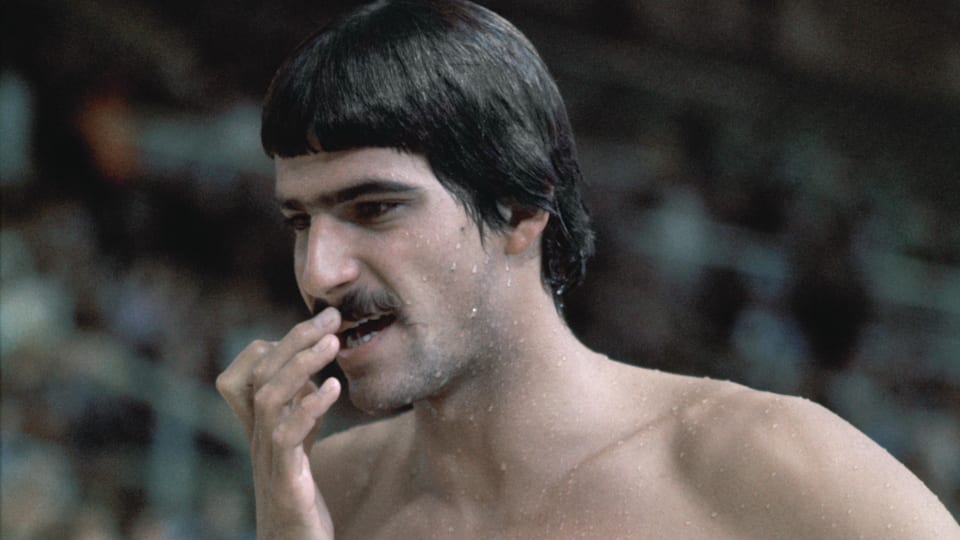
The Olympic Games are full of champions, records and stories, but they’re also an incredible encyclopaedia of strange, funny, emotional and sad moments. We’ll dig some out every week to put a smile on your face or a tear in your eye. This week: The story of Munich 1972 swimming 100m freestyle final with none other than swimming legend Mark Spitz and why a seventh gold almost didn’t happen.
The background
Mark Spitz was the most successful athlete to come out of Munich 1972, winning a total of seven gold medals – an achievement that was only broken by Michael Phelps 36 years later at Beijing 2008 when he took home eight.
But back in 1972, all eyes were on Spitz. He already had six gold medals in the bag but was hesitating to compete in the 100m freestyle final which will have been his shot for a seventh gold.
The reason: Australia’s Michael Wenden had beaten him prior in the preliminaries and in the semi-finals, and Spitz was afraid that losing in the final might tarnish his impeccable gold output.
When Spitz arrived in Munich 1972, he had much to prove. Four years prior, he under performed against his own predictions. In Mexico 1968, Spitz announced that he could win six gold medals but only came home with two golds, a silver and bronze being criticised by the media afterwards.
Winning gold medals in all events in Munich 1972 was his chance to make a statement against his detractors. But being beaten by Wenden in the heat and semi-final made Spitz doubt himself.
Australia's Wenden, a two-time Olympic gold medallist in Mexico 1968, didn’t have the same pressure like Spitz, and was ecstatic to come face-to-face with the swimming legend, ready to fight for a medal.
What changed Spitz's mind to get back in the water? When Spitz heard from the US swim coach Peter Daland that this was swimming’s blue ribbon event and whoever wins will be crowned the fastest swimmer on the planet, he was back at the start line.
The finals
When Spitz decided to compete in the 100m final, he knew that out of all the events, this was the most important. It could make or break his golden streak and his reputation was on the line. Spitz had every intention to defend his medal haul. Wenden on the other hand, had a confidence boost, and also had a shot.
In the end, Spitz used his powerful kick and great stroke techniques to be ahead of the pack. He eventually bested not only Wenden but also Jerry Heidenreich (USA) and Vladimir Bure (Soviet Union) to finish in a world-record time of 51.22, while Wenden finished fifth place.
Spitz’s world-recording wins in Munich 1972 - and his seven on seven golds - will always be remembered as one of the greatest moments in Olympic history.
The outcome
Spitz retired after the Munich 1972 at only 22-years-old. He went on to do endorsement deals and also dabbled in sports presentations for some networks. In 1977, he was inducted the International Swimming Hall of Fame as an Honour Swimmee.
He also tried to make a comeback in the Olympic trials for Barcelona 1992 but failed to qualify. Nevertheless, his many achievements in the sport of swimming are set in the Olympic history books and his name will never be forgotten. He along with Michael Phelps serve as inspirations for the future generation of swimmers.
However, Spitz wanted to clarify the rumour back in 1972.
Looking back at the finals of the 100 metre event, Spitz said in an Olympic.org article: “I was always going for it,” Spitz laughed.
“We let that story permeate a little bit. We spoke about it with a few other coaches and I guess the word permeated a little bit. But it was a bunch of nonsense, to be honest.”
As for Wenden, he may have failed to beat Spitz for that coveted gold medal but he will always cherish his Olympic experience. He also emulated Spitz's stroking techniques two years after the Games.
"I sincerely thank Mark Spitz for letting me copy his stroking technique," Wenden said in the Olympic Channel ORIGINALS Under the shadow of Mark Spitz video.
In 1979, Wenden was inducted to the International Swimming Hall of Fame then at the Opening Ceremony of the Sydney 2000 Games, he was one of eight flag bearers.
